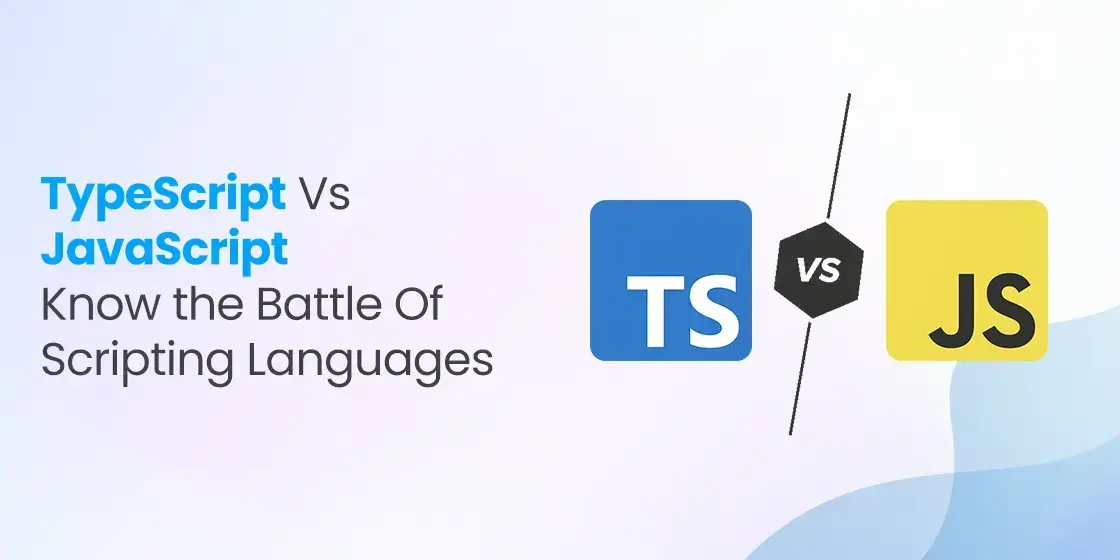Table of Content
Understand the Debate Between TypeScript and JavaScript to See Which Reigns Supreme
In the world of web development, JavaScript has reigned supreme as the de facto language for front-end development for a long time, powering interactive elements on websites and web applications. However, as web applications grew in complexity, developers have sought ways to enhance code maintainability, readability, and scalability. This has led to the emergence of TypeScript, a superset of JavaScript that introduces static typing and other advanced features, and giving rise to the TypeScript vs JavaScript debate.
TypeScript, developed by Microsoft, aims to improve upon JavaScript by adding optional static typing. This means developers can explicitly define the data types of variables, functions, and objects, which can help catch errors early in the development process and improve code maintainability. While JavaScript is dynamically typed, where the type of a variable is determined at runtime, TypeScript allows developers to define types upfront, leading to more robust and predictable code.
The choice between TypeScript and JavaScript depends on the specific needs and requirements of the project. While JavaScript offers flexibility and a vast ecosystem, TypeScript provides enhanced type safety, improved code readability, and better tooling support, making it a compelling choice for large-scale projects and complex applications.
Let’s take a look at a detailed comparison between the two scripting environments, and see why some web development services prefer one over the other.
Understanding TypeScript – A Detailed Overview

As we mentioned earlier, TypeScript is a superset of JavaScript, meaning that any valid JavaScript code is also valid TypeScript code. However, TypeScript adds a number of different key features that enhance its base capabilities, which include:
- Static Typing: Static typing is at the core of features that separate TypeScript from JavaScript. By allowing them to define data types explicitly, developers can catch type-related errors during the development process itself, rather than at runtime. This leads to more robust and predictable code.
- Interfaces: Interfaces allow developers to define the structure of objects, making code more organized and easier to understand.
- Classes: TypeScript also supports classes, which provide a more object-oriented approach to programming than pure JavaScript allows us.
- Generics: Generics provide a way to create reusable components that can work with different data types, helping reduce redundant code.
- Modules: TypeScript supports modules, which allow developers to organize code into separate files and improve code reusability.
These features, combined with strong tooling support, make TypeScript a popular choice for large-scale projects and complex applications. TypeScript is often used in the development of single-page applications (SPAs), simple web app ideas, mobile applications, and in server-side applications in conjunction with Node.js.
JavaScript Explored – Understanding the Popular Scripting Language

JavaScript is a high-level, interpreted programming language that is, and has been primarily used for front-end web development. It allows us to implement interactive web pages and is essential for creating dynamic and engaging user experiences, without which we would still be stuck with the static webpage style of the 1990s.
A testament to its utility can be seen in the fact that despite such a long tenure, JavaScript still reigns among the top two options for dynamic web development. And its all due to the following elements.
- Core Features: JavaScript supports various programming paradigms, including procedural, object-oriented, and functional programming. It has built-in support for arrays, objects, functions, and other data structures.
- Dynamic Typing: JavaScript is dynamically typed, which means the type of a variable is determined at runtime. This provides flexibility but can also lead to unexpected errors.
- Cross-platform Compatibility: JavaScript runs in all modern web browsers and is also used for server-side development with Node.js.
- Large Ecosystem: JavaScript has a vast ecosystem of libraries, frameworks, and tools, including popular frameworks like React, Angular, and Vue.js.
JavaScript is a versatile and powerful language that continues to evolve and play a critical role in web development. Its flexibility and widespread adoption make it a valuable skill for any web developer, as well as among the first choices for newbies learning how to create a web app.
Comparing TypeScript vs JavaScript – A Look at the Pros and Cons Offered
Now that we have explored both the technologies in some detail, you might be wondering – except for a couple of features, both TypeScript vs JavaScript look more or less the same to the uninitiated. However, if you dive a little deeper and look at their features side by side, you see a pattern emerging. You will find JavaScript to be a little generic and TypeScript more elaborate, designed for things like scalability and code reusability.
Think of it like comparing the development languages for a simple web app vs mobile app development. Let’s compare the two scripting environments side by side to see which fulfills what requirements.
| Feature | TypeScript | JavaScript |
| Typing | Statically Typed | Dynamically Typed |
| Error Detection | Early error detection | Errors may not be detected until runtime |
| Code Maintainability | Improved code maintainability and readability | Can become complex for large projects |
| Development Speed | May have a slightly steeper learning curve | Generally easier to learn and use |
| Community | Large and growing community | Vast and mature community |
| Tooling Support | Excellent tooling support with features like code completion and debugging | Strong tooling support, but may not be as advanced as TypeScript tooling |
Choosing the Best Option Among TypeScript Vs. JavaScript for Your Need – A Guide
As can be seen above, the choice between TypeScript and JavaScript depends on various factors. And more importantly, your project’s specific needs dictate which technology would be the better choice. In any case, the factors that dictate your choice of scripting language include:
- Project Size and Complexity: For large-scale projects with complex requirements, TypeScript can offer significant benefits in terms of maintainability, scalability, and error prevention. JavaScript on the other hand, might require a more finessed hand to fulfill the same needs resulting in more effort per project.
- Team Expertise: If your team has experience with TypeScript, it may be a better choice. However, if your team members are more familiar and comfortable with JavaScript, then switching the project to TypeScript might end up doing more harm than good.
- Project Requirements: If the project requires strict type checking and a focus on code maintainability, TypeScript is a strong contender. However, if the project has more lenient requirements, then JavaScript’s long history and community might be better assets in the long run.
- Development Speed: If rapid development is a priority, JavaScript may be a more suitable choice. However, if code scalability and maintenance is a more pressing requirement, then TypeScript would be the better choice.
Ultimately, the best choice of language and even the top web development frameworks depends on the specific needs and requirements of your project, as we mentioned earlier. That is the only factor that truly dictates whether the project warrants a JavaScript team, or a TypeScript team.
Conclusion
TypeScript and JavaScript are both powerful languages that play a crucial role in web development. TypeScript offers several advantages over JavaScript, such as improved type safety, better code maintainability, and enhanced tooling support. However, JavaScript remains a versatile and widely used language with a vast ecosystem.
By carefully considering the specific needs and requirements of your project, you can choose the language among TypeScript vs JavaScript that best suits your development needs.

Empower your digital journey with StruqtIO - Your dedicated partner for cutting-edge custom software development, innovation, and digital transformative solutions. Harness the power of technology to elevate your business and redefine your digital landscape today.



